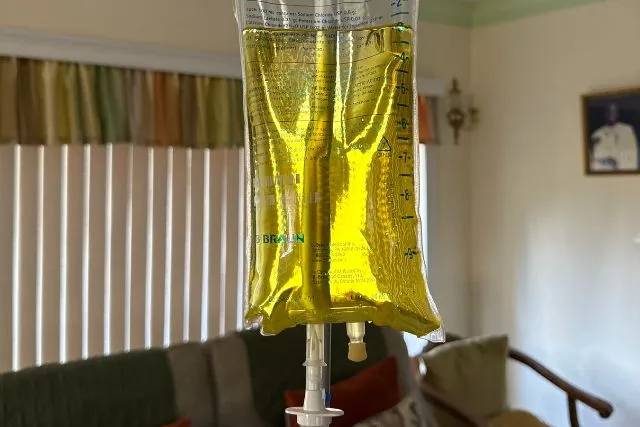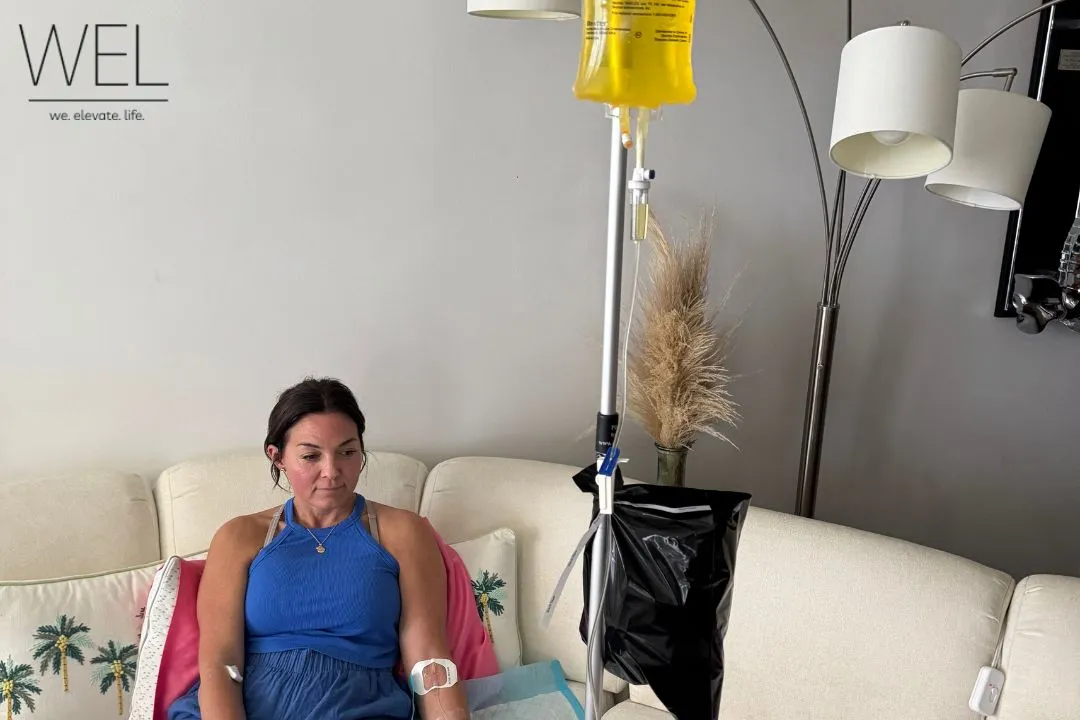Dehydration doesn’t just make you thirsty. It can lower blood pressure and affect heart rate, leading to dizziness, fainting, and cardiovascular complications. Heat exposure accelerates fluid loss, increasing the risk of low blood pressure and heart palpitations.
Palm Beach County’s hot and humid climate worsens the symptoms faster than you think, especially for outdoor workers, seniors, and active individuals. Most sufferers wonder if dehydration causes low blood pressure and heart rate. Learn how dehydration affects your heart, blood pressure, and overall health with the best ways to stay hydrated.
Does Dehydration Cause Low Blood Pressure And Heart Rate?
Dehydration directly impacts cardiovascular function, but its effects on blood pressure and heart rate vary based on the severity of fluid loss.
A reduction in body water volume leads to a decrease in blood plasma levels and a reduction in the amount of blood circulating through the arteries.
This drop in blood volume can cause low blood pressure (hypotension). It results in dizziness, fainting, and inadequate oxygen supply to vital organs.
However, the relationship with heart rate is more complex. Initially, dehydration can trigger tachycardia (a rapid heart rate) as the body compensates for reduced blood pressure.
In severe cases, prolonged dehydration may lead to bradycardia (a dangerously low heart rate). It is mainly due to electrolyte imbalances that affect cardiac conductivity.
How Does Dehydration Affect Your Blood Pressure?
Dehydration affects blood pressure by reducing blood volume. When the body loses too much water, plasma volume decreases, making blood thicker and more challenging to circulate. It causes hypotension.
To compensate, the body activates the renin-angiotensin-aldosterone system (RAAS) to constrict blood vessels and retain sodium and water. It also releases vasopressin (antidiuretic hormone) to help the kidneys conserve fluids.
However, in severe cases, these mechanisms fail and can lead to hypotensive shock, which is a dangerous condition where organs don’t get enough oxygen.
People with cardiovascular disease, diabetes, or those taking diuretics are more vulnerable. Staying hydrated is essential for maintaining stable blood pressure and overall heart health.
How Dehydration Impacts Your Heart Rate and Circulation?
Dehydration puts a lot of stress on your heart and blood flow. When your body loses too much fluid, blood volume drops, making the heart work harder.
Your heart beats faster (tachycardia) to keep blood moving, but this rapid heartbeat is less efficient, which can cause palpitations, shortness of breath, and dizziness.
As blood becomes thicker (increased viscosity), it becomes harder to pump through narrowed blood vessels. It reduces circulation, which can cause cold hands and feet and slower oxygen delivery.
Severe dehydration can also cause electrolyte imbalances, especially low sodium and potassium, which disrupt the heart’s electrical signals. It triggers arrhythmias or even bradycardia.
Over time, dehydration strains the cardiovascular system, especially in people with heart conditions. It increases the risk of hypotensive shock and serious heart problems, making proper hydration essential for heart health.
Major Symptoms of Dehydration Affecting Blood Pressure and Heart Rate

Dehydration reduces blood volume, making it harder for the heart to circulate oxygen efficiently. It causes low blood pressure, increased heart rate, or dangerous arrhythmias.
Key symptoms include:
- Dizziness and Lightheadedness – Reduced blood flow to the brain due to low blood pressure.
- Fainting (Syncope) – A severe drop in blood pressure may cause temporary loss of consciousness.
- Rapid Heart Rate (Tachycardia) – The heart beats faster to compensate for decreased blood volume.
- Weak or Thready Pulse – Blood circulation weakens, making the pulse difficult to detect.
- Palpitations or Irregular Heartbeat – Electrolyte imbalances can disrupt normal heart rhythms.
- Cold or Clammy Skin – Reduced circulation can impair blood flow to extremities.
- Fatigue and Weakness – Low oxygen supply to muscles due to insufficient circulation.
How To Quickly Retain Hydration To Treat Blood Pressure And Heart Issues?
IV treatment is the fastest and most effective way to restore hydration and stabilize blood pressure and heart function. When dehydration causes hypotension or an irregular heart rate, oral fluids may not work quickly enough. In such cases, WEL Palm Beach recommends going for intravenous (IV) fluids as the best option.
IV therapy delivers fluids directly into the bloodstream, bypassing digestion for immediate absorption. It is essential in severe dehydration, where dizziness, fainting, or cardiovascular stress occur.
Key Benefits of IV Hydration:
✔ Rapid Blood Volume Restoration – Isotonic fluids like Normal Saline (0.9% NaCl) or Lactated Ringer’s Solution quickly expand plasma levels. It improves circulation and oxygen delivery while reducing dizziness and organ stress.
✔ Electrolyte Balance Maintenance – IV fluids replenish crucial electrolytes like sodium and potassium, preventing imbalances that could lead to arrhythmias or cardiac issues.
✔ Kidney Function Support – Proper hydration ensures steady blood flow to the kidneys. It stops renal stress and helps regulate blood pressure.
In severe cases, IV therapy for blood pressure is combined with the needed electrolytes and nutrients to constrict blood vessels and restore circulation. This targeted approach ensures quick recovery and prevents complications from prolonged dehydration.
Tips to Prevent Dehydration in Daily Lifestyle
Proper hydration is essential for stable blood pressure, heart function, and circulation. Follow these science-backed strategies to maintain optimal hydration levels.
Daily Water Intake for Heart Health
Men need about 3.7 liters (125 oz) of fluids daily, while women require 2.7 liters (91 oz). However, if you’re physically active, live in a hot climate, or take medications that affect hydration, your needs may be higher.
A quick way to check hydration is by looking at your urine color—pale yellow is ideal, while dark yellow or amber signals dehydration. For better electrolyte balance, especially after sweating, drink coconut water or diluted sports drinks to replenish lost sodium and potassium.
Hydrating Foods That Support Circulation
Drinking water isn’t the only way to stay hydrated. Many foods are naturally rich in water and minerals. Cucumbers, watermelon, celery, oranges, and strawberries contain over 90% water, helping maintain hydration levels.
Soups and broths (low-sodium options) provide both fluids and sodium, which help retain water in the body. Chia seeds, when soaked, form a hydrating gel that slows fluid loss and supports sustained hydration throughout the day. Adding these foods to your meals enhances hydration while supplying key nutrients for circulation and heart health.
Smart Hydration Habits
Palm Beach County’s hot climate increases dehydration risks, especially for outdoor workers, athletes, and seniors.
Drink 500-750 mL of water before activity and carry an electrolyte-infused bottle to replenish lost sodium and potassium. Take water breaks every 15-20 minutes to prevent muscle cramps and heat exhaustion.
Seniors, who may have reduced thirst sensation, should set reminders to drink fluids and eat hydrating foods like melons and cucumbers. Limit alcohol and caffeine, especially when golfing or boating, as both accelerate fluid loss. Stay ahead of dehydration with smart hydration habits.
In Closing
Dehydration can have serious consequences on blood pressure and heart rate, leading to dizziness, fainting, and cardiovascular complications. In Palm Beach County’s hot climate, staying hydrated is crucial, especially for seniors, athletes, and outdoor workers who lose fluids rapidly.
Drinking water, consuming electrolyte-rich foods, and seeking IV hydration when necessary can help maintain optimal circulation and prevent heart stress.
Looking for a professional mobile IV service? IV specialist in Palm Beach County ensures rapid rehydration, electrolyte balance, and optimal heart health at your convenience.
Frequently Asked Questions
Can mild dehydration affect blood pressure and heart rate?
Yes, even mild dehydration lowers blood volume, causing a temporary drop in blood pressure and a faster heart rate. Symptoms like dizziness and fatigue may occur.
How long does recovery take?
Mild dehydration resolves in a few hours with fluids, but severe cases may need IV therapy for rapid blood volume and electrolyte restoration.
Can dehydration cause chest pain or palpitations?
Thickened blood and electrolyte imbalances force the heart to work harder, potentially triggering palpitations, irregular heartbeats, or mild chest discomfort.
Is excessive water intake harmful?
Yes, drinking too much water can cause hyponatremia (low sodium levels), which can lead to low blood pressure, confusion, and weakness. Balance fluids with electrolytes.
How can I prevent dehydration in Palm Beach County’s heat?
Drink electrolyte-rich fluids, eat hydrating foods like melons and cucumbers, and limit caffeine and alcohol, especially outdoors. For severe dehydration, IV therapy quickly restores fluids and electrolytes.

